Canadian Golf Legend Mike Weir Talks Changing His Approach to Life On and Off the Course

Mike Weir, 50, edged out John Daly, 55, to win the 2021 Insperity Invitational at The Woodlands Country Club in Texas on Sunday. The victory marked Weir’s first ever win on the PGA's senior tour. Photo: Ken Murray / Icon Sportswire via Getty Images
Today (April 13) marks the 20th anniversary of Canadian golfer Mike Weir’s Masters win, which made him the first Canadian to ever capture one of golf’s Majors. In recognition of the milestone anniversary — and with the Canuck recently logging his 24th Masters appearance — we revisit our 2021 feature on Weir, in which the golfer explains how turning 50 made him realize that if he wanted to rediscover his old groove, he needed to transform both his physical and mental approach to the game.
March 2020. North America is in the early days of the COVID-19 pandemic. Businesses close. Families are separated. Isolation and loneliness set in as imposed quarantines keep loved ones apart.
The Masters, a spring tradition, had been cancelled for the first time since the Second World War. Which meant professional golfer Mike Weir, who became a household name in 2003 when he was the first Canadian ever to win the iconic tournament, was enjoying some downtime at home in Sandy, Utah, a suburb of Salt Lake City where he lives with his girlfriend – former Bachelor contestant Michelle Money – and her daughter, Brielle.
After a decade of battling physical and personal issues and watching his game collapse, Weir not only turned 50 last May but he also began plotting his comeback and rediscovering the groove that made him the most successful Canadian golfer of all time.
For most of us, golf is a leisurely pursuit that can be enjoyed regardless of our fitness level. But professionals, especially those like Weir who are battling both age and chronic physical ailments, must devote long hours in the gym and on the course to remain competitive.
But putting in the hard work doesn’t guarantee success – even the most promising comebacks can fall apart in the blink of an eye, as we witnessed recently with Tiger Woods. Woods, who engineered a near-miraculous comeback by overcoming a host of personal setbacks (including debilitating back problems as well as a messy divorce) to return to the top of his game – shocking the golf world by winning the 2019 Masters – now faces the likely end of his brilliant career after sustaining multiple leg injuries in a horrible late February car crash.
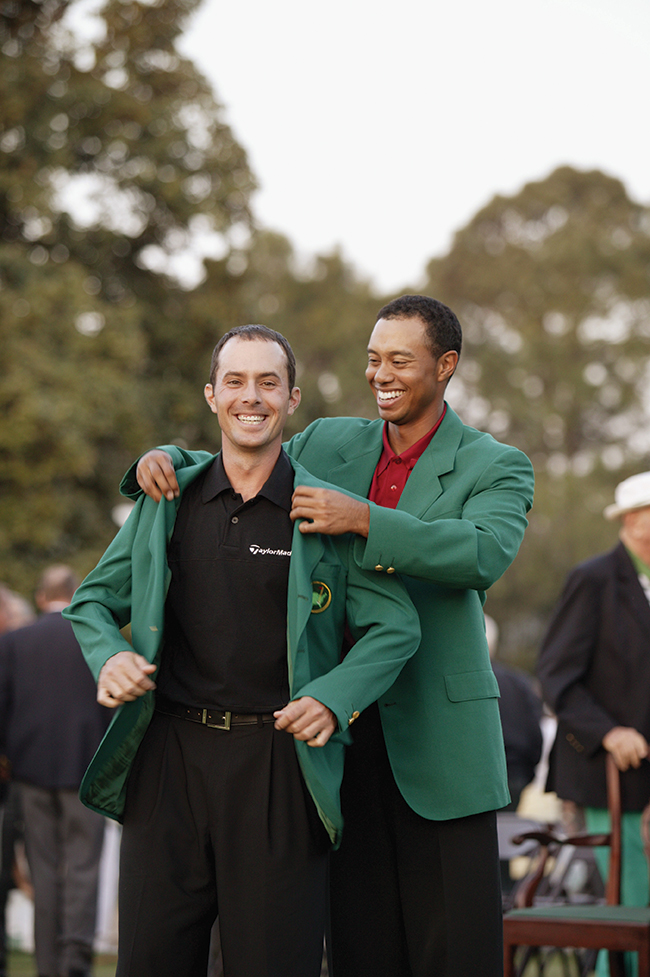
While Weir’s story may never be the subject of an HBO documentary, he can understand some of what Tiger has gone through. After that epic 2003 season, when he won the Masters, tied for third at the U.S. Open and tied for seventh at the PGA Championship, Weir finished the decade winning several tournaments and carding multiple top-10 finishes. However, in 2010, with neck, elbow and lower back injuries hampering his swing, his career went into a dramatic tailspin. After missing the cut in 14 of 18 events in the 2015-2016 season and withdrawing from three others, he took a leave to focus on his family. Off the course, he struggled with personal issues, including the breakdown of his marriage and eventual divorce from Bricia, his wife of 21 years.
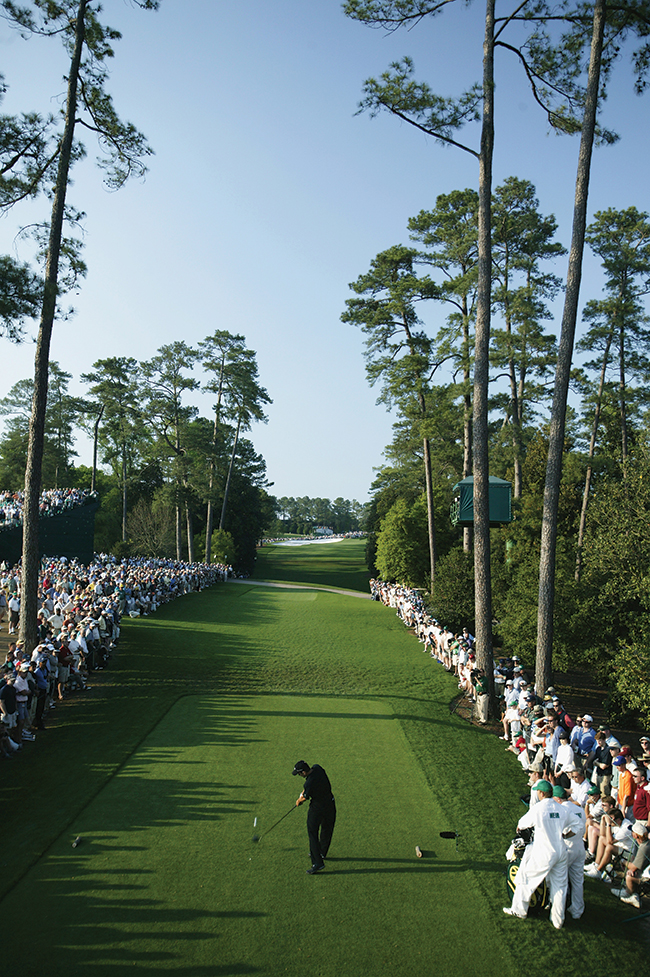
Turning 50 was not only a milestone birthday for Weir, but it provided him with a new goal to focus on – he was now old enough to join golf’s senior circuit, the PGA Tour Champions.
During the pandemic pause, with all professional golf events on hold, Weir began to prepare in earnest. Before the break, he had played in a few events on the Korn Ferry Tour (a circuit just below the PGA Tour) and happily discovered that his game was returning to form – he tied for 17th at the LECOM Suncoast Classic in February, his highest result at a PGA Tour-sanctioned tournament since 2014.
Advances in equipment and innovations in technology in the last 15 years, combined with a disciplined focus on personal fitness not practised by a previous generation of pros, allows golfers like Weir to compete well into middle age.
“All aspects of fitness are important, and you need to have a balance,” Weir explains in a February interview from his home in Utah. “To still be powerful, you have to be limber, supple and explosive. And good cardiovascular health is also important. I run, sometimes bike, hike and ski.”
He focuses on strength training by regularly lifting weights and stretches with a foam roll daily. “I concentrate on areas that are commonly tight on me and most golfers,” he adds. “My hips, back, neck and forearms. I also try to get a massage at least once a week, sometimes twice. Recovery is very important as we get a bit older.”
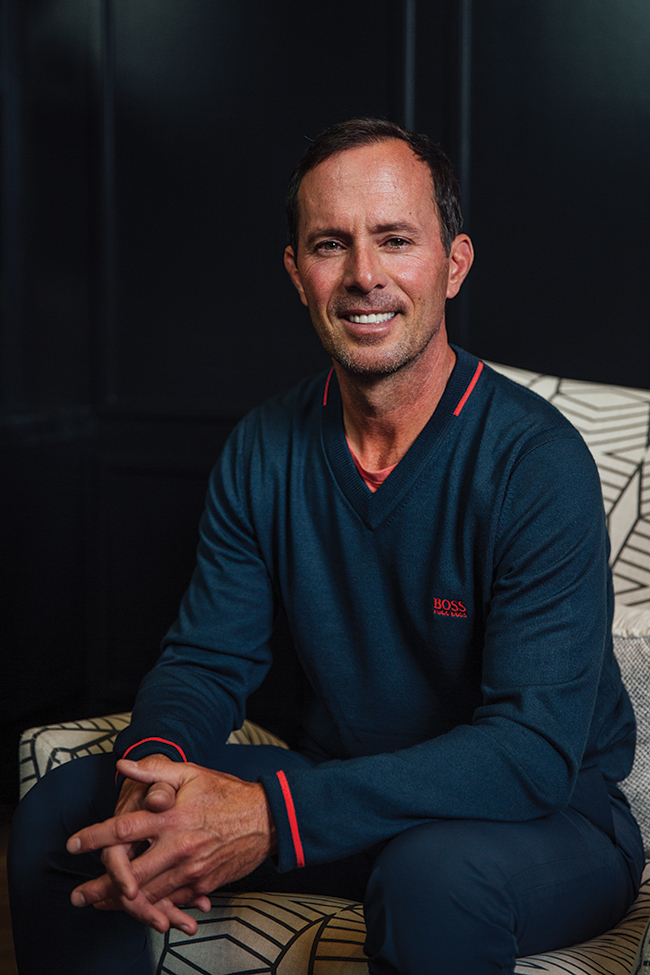
During the months he was grounded in Utah, Weir lifted weights at least three times a week, hit balls into his indoor net and played practice rounds at nearby courses. He also made sure to keep his mind sharp and reduce anxiety by taking long hikes in the nearby Wasatch Mountains, which his golf schedule did not normally allow.
It’s no wonder Weirsy, as fans know him, is feeling rejuvenated and ready to embark on this exciting new chapter in his career. “I’ve done many things over the past few years to prepare for this moment,” Weir says. “First, I assembled a great team [including coach Mark Blackburn, a past member of Golf Digest’s 50 Best teachers list, and Jason Glass, a B.C.-based strength and conditioning coach] that helps prepare my game technically, physically and mentally. Physically, I addressed some limitations that come with getting older, in particular mobility … that’s been a primary focus.”
He feels his game has become more fluid and finds he has more energy than he has had in many years. And the early results on the Champions Tour show that his dedication, resilience and preparations are paying off. In just his second start, he tied for 10th at the Bridgestone Senior Players Championship, and through 12 events in the 2020-21 combined season, he has notched four other Top 10 finishes (including finishing second at the Cologuard Classic) and earned more than US$700,000, good for 15th place on the tour. Even better, he’s averaging 286.8 yards off the tee – remarkably only two less than the 289.2 yards he averaged during his prime on the PGA Tour.
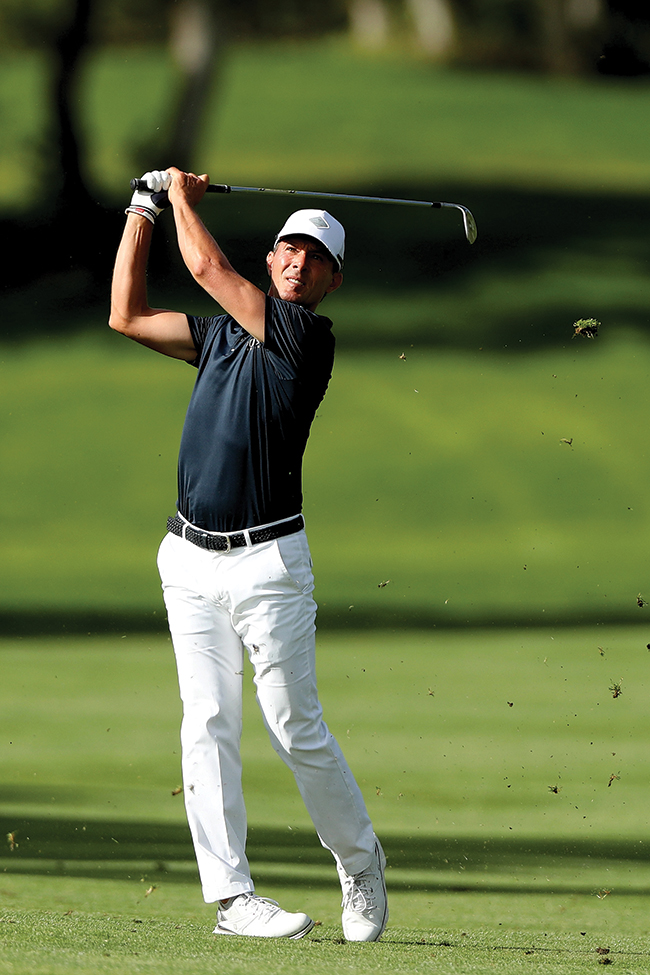
“My range of motion is better, and I have less tightness in my back,” says Weir of his rejuvenated game. “This allows me to play consecutive weeks and increase my ability to practise longer as well. Guys work very hard on the Champions Tour, so if you’re not capable of that you will get passed by easily!”
Hard work has been a defining feature of Weir’s golf career since the Bright’s Grove, Ont., native began making headlines at the Huron Oaks Golf Club in Sarnia, Ont., where he played as a teenager. While his peers worked summer jobs, went to camp or just hung out, Weir practised endless hours.
As a leftie, he felt at a disadvantage competing against right-handed players who dominated the sport. Since then, Phil Mickelson (a three-time Masters champion) and Bubba Watson (two-time Masters champion) have proved left-handed players can win at golf’s highest levels. But when Weir was a teenager, the only professional southpaw that had won a major was Bob Charles.
When he was 13, Weir wrote to his hero, golfing legend Jack Nicklaus, asking the Golden Bear whether he should switch to playing right-handed. Nicklaus not only took time to write Weir back but advised him to “stick to your natural swing – stay left-handed. The fundamentals apply to both sides of the ball, left- and right-handed, and good luck in your dreams.”
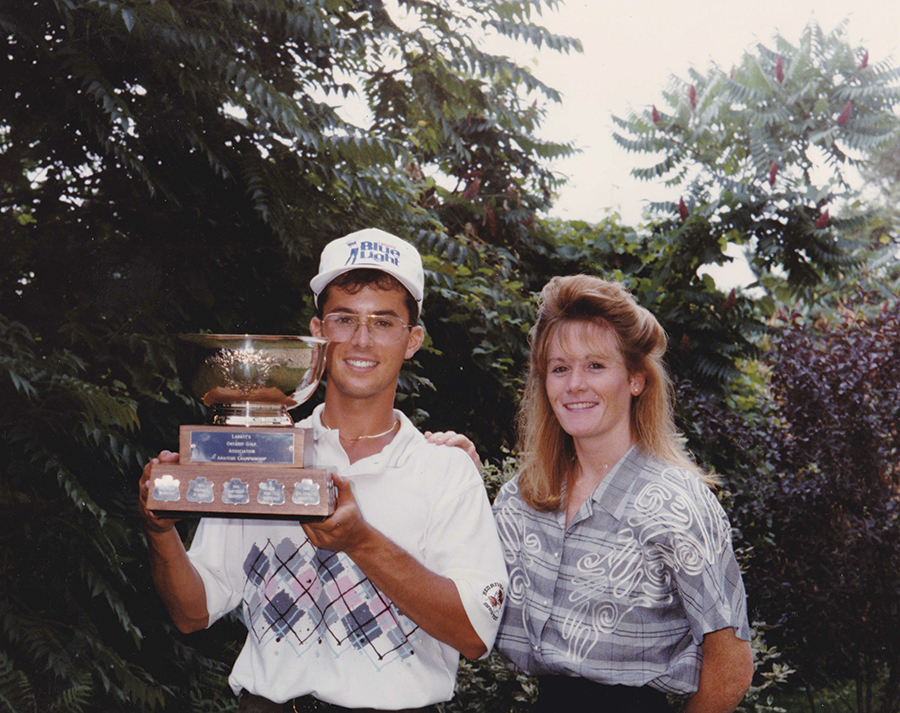
That encouragement from Nicklaus was all the motivation Weir needed to pursue his career. He won the Canadian Juvenile Championship in 1986 and the Ontario Junior Championship two years later. After starring for the Brigham Young University golf team, he joined the Canadian Tour where he spent five grinding years, driving from coast to coast, playing in small towns and frequently living out of the back seat of his car or staying in cheap motels. In 1998, he finally achieved his dream when he tied for 26th in the qualifying tournament and earned his PGA Tour card.
Tom Lehman – a five-time PGA Tour winner over a successful 26-year career – recalls playing a round with Weir not long after the young Canadian had joined the tour. “He reminded me of a young Nick Price [the South African-born golfer who dominated the sport before Tiger arrived],” recalls the 61-year-old Lehman. “He was straight off the tee, accurate with his irons, a fantastic putter and chipper … he was like a mirror image of Price but from the other side of the ball. I knew this guy was going to make a big splash.”
Lehman’s prophecy came true on April 13, 2003, a date etched in the memories of Canadian golf fans, when Weir defeated American Len Mattiace in a one-hole playoff to become the first Canadian – and the first left-handed golfer – to win The Masters.
With that stunning victory at the Augusta National Golf Club, Weir became a national celebrity. Kids from St. John’s to Victoria traded in their hockey sticks for golf clubs. The win also inspired future generations of Canadian PGA Tour players, starting with David Hearn and Graham DeLaet and continuing today with Mackenzie Hughes and Corey Conners.
Hearn, 41, who was born in Brampton, Ont., and turned pro in 2001, remembers exactly where he was when Weir won at Augusta. “I had just finished a full season on the Canadian Tour,” recalls the PGA Tour professional from his home in Boca Raton, Fla. “We played an early practice round somewhere in Arkansas and got back to our hotel in time to watch every one of Mike’s shots on the back nine. We were glued to the TV. It was one of those days every Canadian can relate to. We were so proud, and it was also so inspiring. He became the model for how to practise, prepare and play.” Fellow Canadian golfer Graham DeLaet says Weir is the reason he became a professional golfer. “His Masters win was the biggest factor in me wanting to turn pro after college.”
While Weir has lived in the U.S. for more than three decades, he has never forgotten his roots. He still relishes his role as a mentor to the latest crop of Canadian PGA Tour stars and he’s humbled that they see him as a hero – and look to him for advice – just like he once viewed Nicklaus, Arnold Palmer and others.
“A lot of the younger guys look up to Mike,” Hearn says. “He is a tremendous role model. It’s amazing to watch as he continues to work hard and is seeing success again. It’s no surprise because through all his struggles in recent years, I’ve seen how hard he continued to work.”
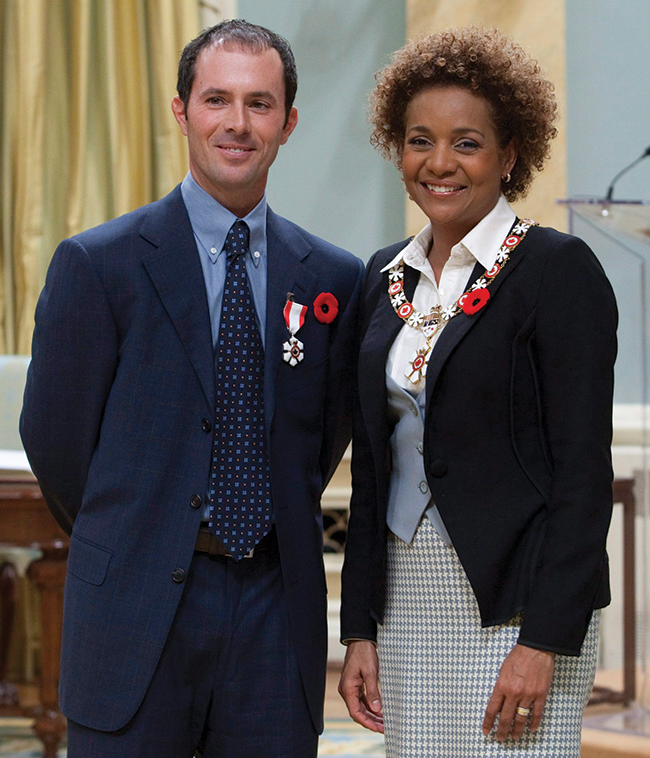
Last November, when the postponed Masters was finally held, Weir returned to the scene of his past glory – winners get a lifetime invitation to join the tourney – to play a practice round at Augusta with three Canadians: Corey Conners (who was 11 when Weir won the Green Jacket), Adam Hadwin and Nick Taylor – giving them tips on how to navigate the course’s treacherous putting surfaces and difficult holes. His advice paid off; Conners finished tied for 10th and Taylor tied for 29th. While Weir finished tied for 51st, it was his best showing at Augusta since 2014.
In April, Weir will tee it up at his 22nd Masters. He’s enjoying life at 50 and if he maintains good health and keeps up his high level of play, he could enjoy another 10 years on the Champions Tour. After all, Hale Irwin, who is 75, is still playing on the senior circuit.
Despite all the success and accolades he has earned in his career – winning eight PGA Tour events, career earnings of US$28 million, playing on five President’s Cup teams, winning the Lionel Conacher Award for Canada’s Best Male Athlete three times and receiving the Order of Canada – Weir remains resolutely focused on the future.
“I’m more of a look-forward-and-live-today type person,” he says. “But many things come to mind: special victories, my relationship with my children [daughters Elle and Lili, both in university], my family and many dear friends. What has sustained me through 30 years of playing professional golf is my love of the game, the gratitude for doing something you love for a living and the many relationships along the way.”
A version of this article appeared in the April/May 2021 issue with the headline “Mike Weir Remastered,” p. 44.
RELATED:
Meet the Members of the Female-Only Golf Club Scoring Birdies On and Off the Green
From Empty Stadiums to Stanley Cup Boat Parades, 8 Wacky Moments that Defined Sports in 2020